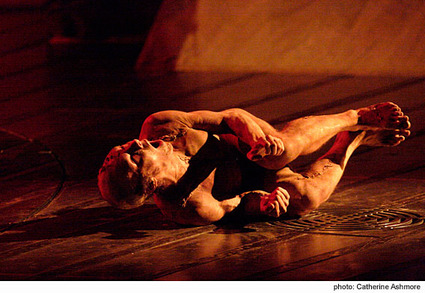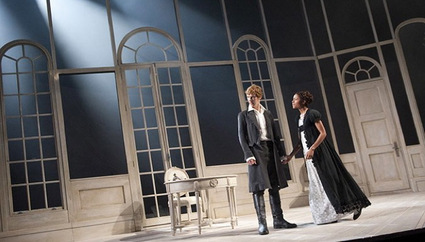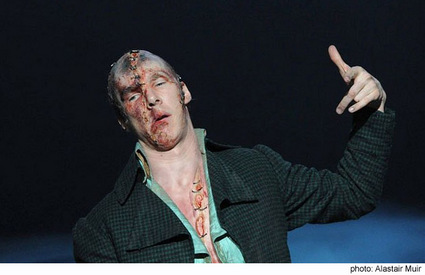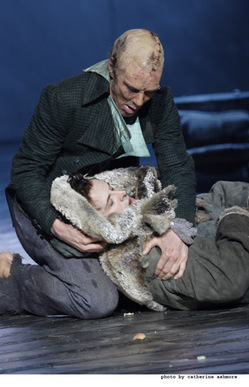 So exactly what is National Theatre LIVE anyway, you may be wondering?
So exactly what is National Theatre LIVE anyway, you may be wondering?
Simply put, it's a program run by the Royal National Theatre in London, which broadcasts live performances of their productions via satellite, to movie theaters, cinemas and arts centres around the world. If you live in the UK or nearby, you'll see it as a live simulcast; like watching a sporting event. And if you live farther away (Canada) you'll see it as delayed broadcast and what we were shown.
Official site: National Theatre LIVE Frankenstein - and where you can buy tickets.
The play Frankenstein was written by Nick Dear and directed by Danny Boyle. Jonny Lee Miller and Benedict Cumberbatch alternate in the roles of Victor Frankenstein and the Creature. Both versions were filmed on March 17, 2011. The evening performance, with Benedict Cumberbatch as the Creature, is the one we saw. The other featuring Jonny Lee Miller as the Creature now, and Cumberbatch as Frankenstein - will be broadcast on March 24 and also shown worldwide. So if you haven't seen it yet, you still can; whereas the stage play is sold out. Has been for a while. It's the hottest ticket in town. Note: NT LIVE tickets are $22.
And what's it like to see Frankenstein inside a movie cinema?
I saw it at the Scotiabank Theater on Burrard in downtown Vancouver with my friend, Cheryl. It's my favorite and not connected to a Mall. We were one of the earliest to arrive and the first thing I noticed, aside from the house lights being on, was the age of the crowd. They were mostly over 40 and a few closer to 70. True; it was St. Patrick's Day and likely accounts for why I didn't see a lot of 20 somethings - too busy elsewhere drinking green beer.
Inside the Scotiabank Theater, which boasts uber-comfy, terrace-style seats with plenty of legroom, a pair of attendants were handing out single-sheet programs as people chatted amongst themselves or greeted friends, and commercials for NT LIVE's current season played on screen. Having caught a few plays over the years, I can report the vibe was similar; you can make a bit of noise before the actual play begins and as promised, it started at 7:00pm.
A spokeswoman for NT LIVE greeted viewers from inside the Olivier Theatre: one of three stages at the National Theatre, located on London's South Bank. And it was definitely a LIVE capture. There was this woman - part of the throng in London arriving to take their seats and unwittingly about to provide us with a moment of cinema verite - for she suddenly stopped behind the one talking, to stare directly into the camera like a deer trapped by the headlights of a car. Cheryl and I smiled at the thought of tens of thousands of people all staring back, and without her realizing how funny her expression looked. I dare say someone she's acquainted with will let her know.
We were treated then to a 30-minute exclusive backstage glimpse of the production and cast during rehearsals, and shown the original manuscript of Mary Shelly's Frankenstein written in her own hand. The sound and picture quality was perfect. No glitches with the feed. The best way to describe it would be to compare the softer look of film to the sharper feel of live television - and using really good HD cameras. As for the stage...
The Olivier Theatre is a steep half-circle auditorium with a revolving center and mechanisms hidden from view that allow set pieces to rise through the stage floor or descend from above. In addition of course, to employing traditional stage hands who deal with moving props. As for the cameras - they were positioned at strategic points either side and blocking no one's view, while granting those inside the cinema with an enviable one. It amounts to watching a play from multiple angles, at varying distances, without it feeling like a movie. More like enjoying the benefit of Opera glasses, when you'd like a closer look. Boyle's direction was sympathetic moreover - his cameras pointed to where I naturally wanted to look and I was never frustrated while watching the play. As for the art direction, long time design collaborator, Mark Tildesley, refreshingly chose not to clutter Frankenstein with Gothic clichés but rather, to take a modern, minimalist approach while employing clever symbolism and visual metaphors.
The giant bell.
It hung above a section of the audience and with a pull of its chord, the play began with the sound of its booming toll ringing out overhead, and where a massive cloud of electricity - 3,500 dangling light bulbs - suddenly lit the stage akin to lighting as the walls turned crimson red: the Creature was being born.




Note: babies aren't born wearing nappies and reportedly, neither is the Creature unless of course, you're shooting a performance for NT Live. Having read that he's initially nude, I assume that's why Benedict was wearing a flesh-colored loincloth. For the camera gets close enough for you see sweat rolling down an actor's cheek - imagine when he bends over, backside to the audience in his efforts to stand for the first time...you see the problem. That would be TOO much information for some.
At any rate and like all babies, the Creature is no less innocent and new to the world. We watch as he emerges from a creepy membrane-chrysalis which appears on stage, to then violently twist, contort and struggle to breathe, speak and move his limbs. It takes him almost 15 minutes to gain his balance and ultimately stand; the actor drenched in sweat, such was the sheer physicality of the performance. Indeed; the camera catches everything you'd ordinarily miss, along with subtle facial expressions. And it's a moment of such triumph for the Creature, that he lets out this delighted though incomprehensible child-like scream of victory!
At which point he forever secures my sympathy, and thereafter can do no wrong for which I cannot ultimately forgive him, by means of empathy. For monster are made, not born. And you can hate what someone does, without hating them for it.
The same cannot be said for Frankenstein. I will always see him, even in moments of despair, as the greater source of his own woe and thus more deserving of it. For upon catching sight of his experiment now awake, he's so repulsed by the Creature's ugliness, he promptly rejects it as a hideous failure and like so much unwanted garbage, a thing to be thrown out and which he is; the Creature cast into the darkness to die. And thus begins a series of brilliant segue vignettes, as we see the horror and beauty of the world introduce itself to the Creature.
A symbol of the modern age and the rise of Industry and Science in the name of progress, bursts loudly then upon the stage accompanied by music; a soul-crushing machine manned by steam-punk figures who serve it and set upon the creature to torment him, sending him fleeing into the night, terrified...

We next see him waking to a sunrise as birds emerge from their nests, and soar into the air, the Creature thrilling at the sight of them, and drinking rain literally falling down onto the stage; such moments serving to mark the passage of time, as much as all he is learning. He next comes upon two men in the woods and has another brush with cruelty and how he obtains clothing; they left some behind. When he encounters people again, it's in the shape of a paper-thin house which magically descends from the sky with William Blake drawings on its roof.
Inside, lives an old man named De Lacey (played by Karl Johnson in a wonderfully touching performance) along with his family; a son and his wife. They leave to toil in a nearby field and the old man is left alone. He has a guitar which he plays and the sound attracts the Creature. Blind and thus unable to react to his appearance, he sees only the good in Frankenstein's monster and takes him under wing; acting as his friend, for he is, noting the Creature's wonderment when it snows, and teaching him to read while doing his best to answer impossible questions.

The lights now serve double-duty as stars, and we too gaze up to ponder and muse the mysteries of life and the ways of God to man; Frankenstein to his creation. The old man has a copy of Milton's epic poem Paradise Lost, upon which the story draws numerous dark parallels and the Creature learns to recite it word for word. Meanwhile, the couple discover that someone is doing their chores. This leads to an amusing moment wherein the young man concludes:
"Tis the work of fairy folk!"
And there are moments of humour, several in fact and scattered throughout the play, moments of wit and poignant observation. They help to undercut the darkness - such as when the Creature is forced to leave the only kindness he's ever known. He was convinced to allow himself to be seen by the couple, who reacted as you'd expect. And rejected yet again, his bitterness rises and he later returns to set fire to the house with all inside it.
Frankenstein's journal was in the cloak taken by the Creature when he was cast out. And thanks to the man he just murdered, he's been able to read it. He knows the name of his maker and sets off to find him.
Frankenstein had left England for Geneva and where he lives with his father (George Harris), along his fiancee Elizabeth (Naomie Harris) and Victor's younger brother William, played by Haydon Downing. These moments are less absorbing but then it's hard to match the two leads; together, they have the best parts. We see the Creature arrive after a year-long journey and watch as he comes upon William near a lake. Stage lighting plays a big part in selling such locations, as the lake is made of little more than a hint of mist upon the floor and pair of long narrow dock-like walkways.
He's looking for Victor Frankenstein and upon learning the boy knows where to find his brother, hoists the nervous child onto his shoulders while aiming to make a game of it. It's anything but. Frankenstein and Co. later find him floating in a boat "pushed" in their direction; William's small lifeless body lying inside it. The Creature killed him. A willful act of murder and part of a plan to draw Victor out, which it does. He heads off in search of his failed experiment, eventually finding him in the mountains. Again, everything is achieved with a minimum of fuss. Shadow and light upon the contours of the stage work to carve what your imagination then paints with more detail in the mind's eye. And I'll always remember the production fondly for the extent to which it allowed me to use mine.
When they finally meet again, Frankenstein is appalled by his brother's murder - but not sufficient to prevent him from marveling at all the Creature managed to learn.
VICTOR: That's Paradise Lost! You've read Paradise Lost? CREATURE: I liked it. VICTOR: Why? You saw yourself as Adam? CREATURE: I should be Adam. God was proud of Adam. But Satan's the one I sympathize with. For I was cast out, like Satan, though I did no wrong. And when I see others content, I feel the bile rise in my throat, and it tastes like Satan's bile..."
And here's where things get really interesting - especially if you've read Paradise Lost. For arguments are given and rational points made and they're an echo of those scored by Satan. And they resonate deeply, for he's partly right. He didn't ask to be born. Why was he created only to be rejected?
Unfortunately, Victor Frankenstein is a megalomaniac who doesn't care about life, only the power to create it.

"I followed nature into her lair, and stripped her of her secrets! I brought torrents of light to a darkening world! Is that wrong?" he argues, and for believing the ends justify the means.
The Creature counters by way of arguing he has as much right to find happiness as another, yet he's been fated to wander the world alone, rejected, despised - and through no fault of his own.
CREATURE: "This the seat that we must change for Heaven? -- this mournful gloom for that celestial light?" A quote from Paradise Lost.
He then presses Frankenstein to create a female companion for him. It takes a bit of doing with threats implied and inferred but eventually, Frankenstein agrees to make another creature; if his first one gives his word that they'll leave the country and never return. A deal is struck and Victor swears to it. He gives his word. And the Creature will hold him to it, he says, before he scrambles up the side of the stage to disappear into the dark.
As for Victor, excuses are invented to account for why he needs to leave Geneva, as he heads off to Scotland to work in secret. A pair of rustic Scottish grave robbers are hired to reluctantly provide him with fresh female corpses - and us with more scenes employing humour to off-set the sinister goings-on. Until finally the Creature arrives, having tracked Victor down in his eagerness to see his bride. (female creature: Andreea Padurariu)

Now imagine for a moment, that you're the Creature. And after everything you've been through and why, along with having your hopes raised, Victor's sense of morality suddenly kicks in and he has a change of heart. Imagine he fools you by way of gaining your trust into thinking he just needs to tweak a few things, then she'll be done! And simply to distract you long enough so he can move her out of sight and kill his second creation (while you wait outside) after cruelly allowing you to see it - and fall in love. And upon discovering the truth, then having to listen as Victor arrogantly rationalizes his choices and decisions. How would you feel..?

The Creature bitterly vows to take his revenge and you could have heard a pin drop inside the Olivier Theatre as Cumberbatch said Elizabeth's name. He races off then, while Frankenstein abandons his mess for the the local authorities to clean-up as they arrive at the scene to gaze upon it in horror. We see her lifeless half-naked body then lying on the ground covered in blood; Frankenstein had stabbed her.
Back to Geneva and a previous set: a minimal white house with white furnishings and where Elizabeth has been waiting for his return. Note: that's actually Cumberbatch in the first photo as Victor, but I wanted to show readers what I meant by the modern nature of the sets and that's best shot of it.


And it's now we hear the voice of womanly common sense. Why, if you wanted to create life, haven't you sought to make it with me?
Victor concedes he's not without his failings but as always and even while in a state of remorse, finds ways to justify himself, and without revealing why he's posting servants as guards around the house. A writer's pretext has him leave the room and with his departure, the play's moment of horror arrives.
The Creature has been hiding under the covers of the bed, and he flings them off now to reveal himself and stand before Victor's bride. There's no hint of it coming so it surprises all. Initially shocked by his appearance, curiosity gets the better of Elizabeth who reaches out then, to gently touch his head. The Creature is all grace and good manners, presenting himself as a man of intelligence, an articulate being, one swearing he won't harm her. And convinced, she does as he bids and moves to sit next to him at the foot of bed where he's now placed himself.
Speaking softly but with words full with intent, he shares more of himself...
CREATURE: Slowly I learnt the ways of humans: how to ruin, how to hate, how to debase, how to humiliate. And at the feet of my master I learnt the highest of human skills, the skill no other creature owns: I finally learnt how to lie..."

And then apologizing for it in advance, he suddenly pulls her down on the bed and rapes her. The camera's overhead, giving us a down-shot and which actually reveals the mechanics of the illusion underway; ie: if you were sitting in the Olivier Theatre, I'm sure it looked much worse, but it's thankfully obvious he's not really hurting her. They're just selling it well, you know? And it's at that precise moment, Victor Frankenstein re-enters the room.
The Creature finishes with a final thrust as Victor cries out - only to watch helplessly as with a quick movement of his hands, the Creature unceremoniously snaps her neck. He's killed her. He lifts himself off her, to lay the blame for it at Victor's feet, who sits devastated on the floor at the end of the bed, confronted by all he's done and given breath to. While the Creature, aware of what he has done, then makes his escape.

The conversations which take place throughout the play, between Victor and his creation, are nothing short of enthralling. With each encounter, they've raised the stakes and in the process, become like two side of the same coin with each guilty of the other sins while being the source of them. Victor's father then arrives with the maid and they discover the body as Victor heads off, swearing to devote the rest of life to tracking down the Creature; vowing to kill him.
The stage transforms itself into a blinding white landscape covered in snow and ice. Again, as suggested by the use of clever lighting. The Creature has led Frankenstein on a grueling chase, all the way to the Artic and where at last he finds his creator exhausted, supplies gone, his sled dogs dead. The Creature revels in Victor's plight while again restating his arguments and taking open delight in the pain and misery he sees; even sharing brief details of the rape, reminding Victor of his dead bride: as dead as the one he'd murdered.

Until he notices Victor isn't responding to him anymore - and a wave of aching desolation washes over the Creature then and he throws his arms around Frankenstein crying, "don't leave me to be alone!"

Their ultimate fate arrives now, the one foretold earlier by the ringing of a bell, with Victor regaining enough strength to vow once more to destroy his failed creation - seeing only that he has to, without owning the reason why. Which the Creatures nonetheless happily embraces, sharing that the only thing that will destroy him is if Frankenstein dies first, for until he does, he will have company in his isolation.
And together they set off, man and his creation, towards a dark bleak spot on the back wall, where they disappear from view; officially drawing the play to a close.
The Olivier Theatre exploded then with the sound of wild applause, and we watched as the supporting actors appeared again on stage to accept and acknowledge the praise - the loudest reserved for Benedict Cumberbatch, who reemergence was met with a mighty roar. And rightly so, as damn, but he can act. And I'm sorely tempted now to buy another ticket to see Jonny Lee Miller take his turn as the Creature. For it's a hell of a part, and I gather he's equally as brilliant in the role.
Feeling happy and content for being so well entertained, Cheryl and I left the cinema then and parted company shortly thereafter as I headed home on the Skytrain. Along the way I found myself reflecting upon all that I had seen and heard. The play is packed with weighty themes, and which ask more questions than they answer.
It's a debate about the responsibilities of the creator. And a cautionary tale about technology. It's about the relationship between fathers and sons, especially those abandoned, so too, the consequence of playing God when motivated by pride. But most of all, I think it's about a poor creature who wanted only to be loved, and the extent to which a want of empathy and compassion is to blame for the tormented monster he became.
And that, a metaphor for the relationship between men and the world and misery some thoughtlessly create, only to disown any part of it.
You can pay $15 to watch a movie in 3D. And reportedly for the thrill of feeling like you're "right there" in the thick of things. I say better to spend your money at the Theatre, if that's what you're looking for. As what's more real than LIVE theatre, however you come to see it - especially when it's a play like Danny Boyle's Frankenstein. For it says a hell of a lot about how well they told the story, that I still can feel empathy for the Creature, despite everything. And why part me aches for the soul I saw taking its first steps; how bittersweet now that cry of victory.





